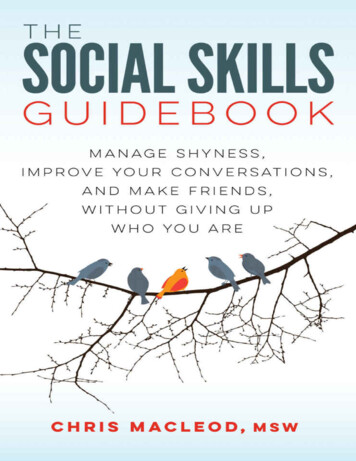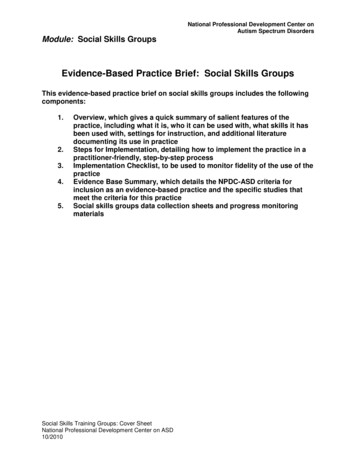
Transcription
CopyrightCopyright 2016 by Chris MacLeod, MSWALL RIGHTS RESERVED. No part of this publication may be reproduced,stored in a retrieval system, or transmitted, in any form or in any means –by electronic, mechanical, photocopying, recording or otherwise – withoutprior written permission.ISBN: 978-0-9949807-1-7Editor: Vicki AdangCover and interior design: Victoria Valentine/Page and Cover Design
Table of ContentsTitle PageCopyrightTable of ContentsIntroduction1. The Overall Process of Improving Your Social Skills2. Addressing Some Common Challenges and Concerns aboutWorking on Your Social SkillsSection 1: Tackling the Main Mental Barriers to Socializing3. Seeing the Effects of Shyness, Social Anxiety, Insecurity,and Discouragement4. Shifting your Mind-Set about Your Social Discomfort5. Handling Counterproductive Thinking about Socializing6. Hands-On Strategies for Taking the Edge Off Anxiety7. Reducing Fears and Insecurities through Real-WorldExperiences8. Increasing Your Self-Esteem and ConfidenceSection 2: Developing Your Conversations Skills9. Getting a Basic Feel for Conversations10. Dealing with Awkward Silences11. Starting One-on-One Conversations12. Having Deeper Conversations13. Ending Conversations14. Navigating Group Conversations15. Making Conversation in Particular Situations16. Becoming Aware of Empathy17. Core Listening Skills18. Recognizing and Acting on Other People’s NonverbalCommunication
19. Improving Your Own Nonverbal Communication20. Conversation Mistakes21. Being More Likable22. Being More Fun23. Assertiveness SkillsSection 3: Forming and Growing Friendships24. Introduction to the Process of Making Friends25. Finding Potential Friends26. Making Plans with Potential Friends27. Deepening New Friendships28. Making a Group of Friends29. Making Friends in Particular Situations30. Troubleshooting the Process of Making Friends31. Looking Forward as Your Social Skills ImproveAppendix A: Asperger's Syndrome / Mild AutismFurther Reading
IntroductionTHIS BOOK IS FOR ANYONE who feels they need to brush up on their socialskills. Maybe you feel shy, anxious, and insecure around people. Youstruggle to make conversation and leave a good impression on others.You’re lonely and isolated and don’t go out nearly as often as you’d like, oryou only have a few casual acquaintances and want some closerrelationships. Maybe all of the above. Maybe you feel like you somehowmissed out on learning the unwritten social rules that everyone else seemedto have gotten the hang of by the time they were thirteen.If you have these social difficulties, you’re not alone. You may feel like auniquely broken outcast, but they’re all common issues. Millions of peoplefeel the same way you do.The good news is that these social problems can be fixed. The concept ofa “late bloomer” exists for a reason. Lots of people were shy or lonely for aperiod in their lives before they developed their interpersonal skills and putthe shyness or loneliness behind them. You can increase your selfconfidence. You can learn to manage shyness and anxiety and thecounterproductive thinking and behaviors that feed them. You can practiceand hone your conversation skills. You can learn a reliable process to meetfriends and build a social life. Even if aspects of socializing don’t come thatnaturally to you and you’ll have to work a little harder at it than most,
nothing about your situation makes you a lost cause.You don’t need to completely change who you are to become moresocially successful either; you can leave your interests, values, andpersonality traits intact. You just need to fill in the skills or confidence gapsthat are currently holding you back. Then you’ll be a more socially polishedversion of yourself. The goal of this book is to give you the tools you needto become socially happy in whatever way works for you, whether thatinvolves partying all the time with a dozen casual acquaintances or mostlykeeping to yourself except to occasionally meet with a few really closefriends. It doesn’t want to turn you into someone who acts fake so they canappeal to as many people as possible.This book is a comprehensive guide to catching up socially. There aretitles that cover shyness or conversation skills separately, but this one tellsyou everything you need to know in one place. The author struggled withall of these issues himself when he was younger and wrote this as the guidehe wished he’d had at the time.This book teaches the fundamentals you somehow missed learning as youwere growing up. It addresses barriers that only come up for people whohave been struggling socially for most of their lives.If social skills could be rated on a ten-point scale, it’s about helping youget from an unhappy 3 to a content, functional 7 (or higher). It’s not acollection of little-known tricks that will let you move from average toadvanced. It won’t reveal five secret tricks that CEOs use to make theirhandshakes extra memorable and influential. That said, charismatic peopleare that way not because they have access to a bunch of techniques most ofus don’t, but because they execute many of their social fundamentals a littlebetter than normal. In that sense, this book may help you someday have lotsof charisma by making you aware of the core skills you could developbeyond a typical level.
This title focuses on day-to-day socializing. It doesn’t cover workplacespecific issues like how to manage difficult colleagues, influence your boss,or nail that product demonstration. It also doesn’t go into dating and flirting.However, if you’re struggling socially, most of the topics covered hereshould help your career or love life. You can hardly woo someone or getalong with your coworkers if you have trouble with conversation or can’tmanage your anxiety around people.What’s aheadAfter a few opening chapters about the process of working on social issues,the book covers three core areas of social skills:1. Dealing with shyness, anxiety, and insecurities, and feeling morecomfortable and confident with yourself and others2. Making conversation and interacting with people3. Meeting people and making friendsThe sections build on each other—you’re going to struggle to makeconversation if you’re anxious and insecure, and you’re going to have ahard time making friends if you can’t keep an interaction going—but youdon’t have to read them in order. If you feel your confidence andconversation skills are already okay, then using the suggestions in the“Forming and Growing Friendships” section may have the biggest andquickest impact on your social life.
1The Overall Process of Improving YourSocial SkillsAS YOU WORK TO IMPROVE your social skills, you must approach the processin the right way. Many people struggle to improve their social skills notbecause they’re up against impossible challenges, but because theyapproach the task from the wrong angle and get unnecessarily discouraged.With the right mind-set, expectations, and approach to improving, you’llmake more progress. This chapter covers some things you should knowbefore working on your issues. Chapter 2 troubleshoots some commonquestions and concerns people have about improving their social skills.Figuring out which skills and traits to work on andwhich to leave aloneAs the Introduction said, you don’t need to change everything aboutyourself to do better socially. Of course, you’ll want to address clear-cutproblems that most people would be happy to be rid of—shyness andanxiety, low self-confidence, unpolished conversation skills, and lack ofknowledge about how to make friends.The traits listed below can also cause social problems. They’re allperfectly valid variations from the norm that you shouldn’t have to change.However, they can lead to practical social inconveniences when eitherpeople misunderstand and look down on the traits, or the traits cause you tohave competing needs.
Acceptable, though sometimes impractical, social differencesHaving an introverted personalityLiking to spend a lot of time aloneNot needing or wanting a ton of friendsBeing selective when choosing who you want to be friends withPreferring to socialize for shorter periods of time, and then headhome to relax and recharge your batteries; having a tendency to getdrained by socializingBeing into low-key types of socializing and choosing to avoid rowdyparties or getting drunkPreferring to hang back and listen more in conversations, rather thantalking a lot and trying to hold the spotlightNot having a bubbly, expressive, excitable personalityBeing able to take or leave aspects of socializing, like makingchitchat with strangers waiting in a line with youPreferring your conversations to have lots of substanceBeing into “uncool,” non-mainstream hobbiesNot caring about seemingly popular interests like team sports orreality TVLiving an alternative lifestyle or being part of a non-mainstreamscene or subcultureHaving beliefs and values that differ from the mainstreamHaving a more quirky personalityAs examples, having non-mainstream hobbies may hinder you if theycause your peers to stereotype you and write you off without giving you achance. Liking to spend time alone may cause a conflict in your socialgoals. Part of you may want to go out more to make new friends, but yoururge to hang out by yourself may get in the way.
You’ll have to decide for yourself how to approach your acceptabledifferences in light of your social goals. Wherever possible, you should betrue to yourself and try to find your niche, which includes looking forfriends who get you and like you for who you are.No one is socially perfect. As long as they bring enough positives to thetable, they can still get by. If you read a piece of advice in this book youaren’t crazy about following, ask yourself, “Would it make me happier onthe whole to skip this suggestion? Could I handle the consequences of notfollowing it?” For example, maybe you’re at peace with having a bluntercommunication style and can live with the fact that it will occasionally putsome people off. Maybe you’ll even decide you’re okay with aspects ofyour being mildly shy, even if it is technically a “problem.” Be your ownjudge of what works for you.At times you may weigh the pros and cons of a situation and find it suitsyou to go along with certain social conventions. For example, in yourperfect world you’d never devote a second of thought to fashion, but yourealize other people value it and so learn to dress a little better. Or you likespending a lot of time alone, but you push yourself to be around peopleslightly more than you’d prefer so you have enough time to practice yoursocial skills and be with your friends.You’ll have to decide for yourself where you are and aren’t willing tocompromise. Changing isn’t an option if something violates your deepestvalues or you outright dislike it. The pragmatic approach can work if youfeel indifferent toward something and it doesn’t take that much effort to goalong with it. However, there are always going to be parts of the socialworld, where even if you realize intellectually it would be practical to goalong with them, you’re just not going to be able to play along. Most peoplearen’t going to give up their religious or political views to fit in. As a lighterexample, some men don’t care about sports, but know they’d have an easier
time relating to other guys if they were into them. Some never come to lovesports, but can make themselves follow just enough news about gameresults and trades to grease their conversations. Others can’t bringthemselves to do even that, and they’re fine living with the minor hasslesthat causes.Keep an open mindAlthough you don’t need to completely change or sell yourself out to dobetter socially, you should try to keep an open mind. Be open to newexperiences and the possibility that one day you may develop traits orcome to appreciate things you never thought you’d enjoy. People changethroughout their lives. It’s important to be true to yourself, but not to thepoint where you become locked in place and dismiss anything new with“No, that’s not who I am.” Say a friend invites you to an introductorysalsa class, and you’ve never done much dancing. Even if you sense it’snot something you’d get a lot out of, it’s too rigid to blindly say, “No,that’s not me! I don’t like dancing and never will!” You don’t have tomindlessly try everything everyone suggests, but you never know—youmay actually love partner dancing and just not realize it yet.Realizing your interpersonal skills don’t have to beflawless to have a satisfying social lifeCountless people in the world have fun social lives even though they’re abit shy and insecure, or they sometimes stumble in their conversations, or
they don’t have a ton of fascinating hobbies, or they have a few irksomepersonality quirks. Even charismatic people make bad jokes or have theirinvites turned down. You don’t need to perfectly execute every skill in thisbook 100 percent of the time, and you don’t have to get every last person onthe planet to like you. You just need to be good enough to get by and havefriends who accept you for who you are. You don’t need all of yourinteractions to go flawlessly. You just need enough of them to go well thatyou can meet your social goals (if you invite ten people to hang out andonly three accept, but they go on to become your good friends, that’s a win).Practicing your social skills to improve themSocial skills are skills like any other. Reading advice can give you an ideaof what you need to work on and help the learning process go moresmoothly, but in the end you have to practice to really get things down.You’ve probably socialized for fewer overall hours than many of yourpeers, and you have to put in the time to catch up.That seems obvious, but when it comes to interpersonal skills, somepeople think they can be gained all at once through the right trick, insight,psychology “hack,” or confidence booster. They likely think that becausesocial skills are non-physical and mundane. People instinctively understandit takes time to learn complex physical abilities like skiing or drawing.However, when it comes to socializing, their thought process is, “It’s justtalking. I already know how to do that. So just give me some secret supereffective conversation formulas, and I’ll be off to the races.”Additionally, most people have found that navigating a social situationwas easier when they were temporarily more confident than usual. So theyfigure there must be a way to be extra-confident all the time. However,although you can fleetingly become unusually self-assured, there’s no wayto call that feeling up on command or lock it in place for life. There really
are no shortcuts. If there were, they’d be common knowledge, and this bookwouldn’t be needed.Knowing what are you working on when you practice your social skillsAs you practice socializing, you’ll develop the following overall abilities.In some interactions, you’ll draw on only a few of them, while otherinteractions will require you to juggle many at a time.1) Your ability to think on your feet. When it’s your turn to saysomething, you can’t take forever to come up with your response. Also,aside from the relatively predictable first minute or two, interactions canquickly go in countless directions. It’s unfeasible to try to plan outeverything you’re going to say ahead of time or map out how to handleevery scenario in advance. The best you can do is learn some generalguidelines and then sharpen your ability to improvise.2) Your ability to multitask. When you’re interacting with someone, youhave to continually attend to several things at once. The other person isconstantly sending signals through their words, actions, and nonverbalcommunication; you have to take it in, evaluate it, and decide on the flyhow to act on your conclusions (“They just said they’re not familiar withcycling. I’ll have to adjust how I tell my anecdote.”). At the same time, youhave to manage the signals you’re sending (“I’m curious about what time itis, but I won’t check my watch now because it may make me look like I’mnot interested in their story.”). As you get better at socializing, taking in allof that information and deciding what to do with it starts to feel lessoverwhelming.3) Your proficiency in a variety of concrete subskills like listening,asserting yourself, or phrasing an invitation. Like with any skill, at firstyou’ll be clumsy and exaggerated when you listen actively, assert yourself,or extend an invitation, but in time you’ll develop a defter touch and be able
to calibrate your behavior to the situation at hand. For example, whenyou’re first getting the hang of listening skills, you may sometimes comeacross as an over-the-top therapist. With more practice, you’ll be able toshow you care and that you’re paying attention in a more subtle way.4) Your comfort level with various subskills, like making eye contactor starting conversations. Some subskills, like making eye contact orinitiating a conversation, will make you feel nervous or unnatural at first,but the more you do them, the more normal they’ll feel.5) Your general knowledge of people, what makes them tick, and howthey tend to react to various things. Every person is different, but withenough social experience, you’ll start to notice broad patterns you can acton. For example, you may notice that people who are into a certain hobbyalso tend to share the same political beliefs and conversation style, and youcan adjust accordingly.6) Your knowledge of various social situations and how to navigatethem. You can learn this through firsthand experience or by observing otherpeople who are more socially experienced than you. It’s possible to findadvice on common scenarios, like how to approach people at a party or turndown an unreasonable request, but in your day-to-day life, you’ll comeacross other scenarios that are too rare and esoteric to end up in any book.When you come across these novel situations, you may not always handlethem perfectly, but with time you can build up an overall sense about howto approach them.7) Your knowledge of the unwritten social guidelines of yourparticular culture, subculture, or group of friends, and how to adjustthe general communication-skills rules to fit them. This is another reasonit’s impossible to explain how to deal with every situation ahead of time.What may be considered an appealing conversation style in one country oramong one circle of friends may be seen as obnoxious elsewhere. The only
way to learn the rules for your social context is to be in it and observe themfor yourself.8) Constructive mind-sets toward socializing. A well-intentioned, butunhelpful, variety of social advice is to suggest you adopt useful, but easiersaid-than-done, mind-sets like, “Don’t care too much about people’sopinions of you” or “Just go out to have fun and don’t fret about how wellyou socialize.” It’s great if you can think like this, but you don’t instantlyacquire those worldviews just by reading they’re good to have. Instead, asyou socialize more and more, you’ll have many small experiences andsuccesses that show firsthand these are good ways to think, and you’llgradually add them into your worldview.9) Your personal social style. There are some general guidelines for whatmakes for a better or worse interaction, but there isn’t a single right way tosocialize. Everyone has his or her own personality and strengths andweaknesses. There are usually multiple ways to handle any situation. Whatworks well for another person may not fit you at all. Your friend may begood at cheering people up by being a good listener. You may be better atbeing funny and helping them take their mind off their worries.Ways to practice socializingYou can practice your social skills in three ways. First, if you feel you’resocially inexperienced all around, you can simply find ways to spend moretime socializing. This method is unstructured, but you’ll still learn newthings from all the extra hours you’ll rack up, and hone a variety of skills.You cansocialize more with the people you already know (existing friends,coworkers, classmates, roommates, family members);get a job that involves lots of interaction with people (for example,
retail, restaurant server, bartender, call center, sales);sign up for a volunteer position that involves socializing (forexample, fundraising, talking to seniors, helping out at a festival);join a club, team, or organization;attend online-organized meet-ups (for example, from a forum youuse, through sites like Meetup.com);take advantage of natural opportunities to have brief, friendlyinteractions with people who are generally expected to be pleasantand chat with you, such as store clerks and restaurant servers;go to a venue where people can show up alone and be social with theother patrons (for example, a board game café, a pub or pool hall);interact with people online (for example, chatting with people whileplaying a multiplayer game). Of course, this can’t be a completesubstitute for face-to-face practice, but it shouldn’t be dismissedentirely either; orif it’s a realistic option, travel and stay in busy, social hostels.A second method is to practice in a deliberate, structured way, especiallyif you want to work on specific skills. For example, if you have troublestarting conversations, you could attend one online-organized meet-up aweek and talk to at least five new people each time. If you have troublewith a specific type of interaction, like inviting someone out or turningdown an unreasonable request, you could practice by role-playing thescenario with a friend or family member. Some organizations andcounseling agencies run social skills training groups that provideopportunities to practice in a safe, supportive environment.A third way to practice socially is to take a class to learn a performanceoriented interpersonal skill like public speaking, acting, or improv or standup comedy. These more specialized skills don’t fully carry over into day-today situations. A rehearsed, memorized speech isn’t the same as a
spontaneous, casual conversation. However, they still provide a lot ofbenefits. For example, speech classes may teach you how to project yourvoice and use confident body language. Performing in a play may help youdeal with your nerves and fear of being on the spot. Improv teaches you tobe more loose, playful, and spontaneous in your conversations. Manypeople also find they get a small confidence boost in their daily interactionsfrom knowing they’re getting the hang of a more intimidating skill likespeaking in public.You don’t have to spend a lot of time talking to strangers in public topractice your social skills. Some people think they have to chat with abunch of randoms at the mall or grocery store. If you’re specifically tryingto get used to starting and carrying on conversations with people you don’tknow, that’s one thing. If you generally want to rack up some socialexperience, talking to strangers is usually too stressful and inefficient. It’sbetter to practice with people whom you know and are already somewhatcomfortable with, or strangers you meet in more structured situations likean art class.Indirectly improving your social successAlthough directly addressing the less-practiced aspects of your social skillsis essential, you can also indirectly help your cause by becoming a morewell-rounded, knowledgeable, interesting person. This works in a “wax on,wax off” kind of way. Imagine you did nothing to directly practice yoursocial skills for three months, but spent that time traveling, discovering newmusic, and learning to mountain bike. At the end of those three months,many social situations would likely go more smoothly for you. You’d havemore to talk about and relate to people over, and you’d really notice adifference if you ended up in a conversation with a traveler, cyclist, ormusic fan. The struggles of traveling and learning to mountain bike would
have increased your overall confidence or maybe made you more fun andadventurous. The experiences you had on vacation may have some cachetand make people want to chat more with you so they could learn moreabout them.That’s not to say that if you pick up a bunch of new hobbies, you’ll beable to duck out of the direct practice requirement. Also, some people hearthis advice and they try to learn about and do everything, hoping to get themaximum social benefit. Of course that’s not feasible.Knowing how long it will take to catch up in yoursocial skillsOf course, it’s hard to estimate how much time you’ll need to polish yoursocial skills because everyone starts from a different place. One to threeyears is a reasonable amount of time to expect if you’re behind all around,as opposed to needing help with a smaller area or two. It generally takes afew years to get half-decent at many skills.Reading that may leave you feeling discouraged: “It may take me threeyears? Are you kidding me?!” That estimate isn’t meant to bring you down,but to be straightforward and realistic about the process. In the long run,knowing what to expect prevents more discouragement than it creates.Hearing the news doesn’t feel good up front, but when you’re six months inand have a bad day, you can put it in perspective and not see it as a sign thatyou’re hopeless. If this book falsely led you to believe social skills arequick and easy to obtain, you’d feel worse—and maybe even give upentirely—if everything didn’t fall into place after a few weeks.One to three years may seem long, but the process of improving won’t bea grind the entire time. As with learning anything, it will be roughest at thebeginning and then get more enjoyable and comfortable once you’ve
developed a basic foundation. It’s like learning to play the guitar: In the firstmonth it hurts your fingers to hold down the strings, and it’s anaccomplishment to play a chord properly, let alone to switch betweenseveral of them quickly and smoothly. At the six-month mark, the situationis far different. You’re still a clueless beginner in the grand scheme ofthings, but you know enough that practicing isn’t a complete struggle, andis often fun when you get the hang of a new song. It’s the same withsocializing. At first it may be nerve-racking to make polite chitchat withsomeone for a few minutes. A year in you may confidently head to a partywith a bunch of friends and know you’ll get in some mingling practicewhile you have a good time with everyone.Not all progress comes slowly either. Some areas are easier to makeimprovements in than others. For example, there are some simple, commonmistakes people commit when trying to make friends, and after they knowhow to avoid them, their social lives often improve quickly.You have more time than it seems. Late bloomers often worry that theirbest years have passed them by and they’ve missed the window for having afulfilling social life. That’s not true at all. Social skills can be learned at anytime in your life. After you’re caught up, you’re caught up. Learning socialskills isn’t like learning languages, where our brains are wired in such away that it’s harder to learn new ones after childhood. There’s no door thatcloses when you reach 20, 25, 30, or any other arbitrary age. You will haveopportunities to enjoy yourself and socialize throughout your life. If you’rein your early twenties or younger, you may believe that after college all thefun dries up and everyone becomes boring and bogged down byresponsibilities. Not true. People never stop socializing and having funtogether.It can be frustrating to hear you have to wait before you can get what youwant, but try not to succumb to impatience. If you’re impatient, you may
give up on helpful suggestions because they’re not working instantly. Youalso might chase one supposed quick fix after another, instead of stickingwith proven approaches that are slower and less glamorous. When you doget discouraged or impatient, remind yourself that social skills take time todevelop; it’s not realistic to expect to become an expert overnight. Also,look at where you are now compared to where you began. You’ll be morelikely to keep going when you can show yourself you’re makingimprovements.Expecting your emotions to swing up and downYou can broadly divide the process of putting your social problems behindyou into an initial, more frustrating phase, and a later one where the sailingis smoother. As you improve your social skills, practicing them becomeseasier and more encouraging, and you have a sense the worst is behind you—success is just a matter of time if you stay the course.Your moods can be rocky during that first phase. Whatever happens,you’ll tend to read too much into what it means for the future. If you have agood day, you’ll be overly excited and feel like you’ve finally turned acorner and everything will be okay. When you inevitably have an off day,you’ll conclude you’re hopeless and you’ll never have better social skills.With more practice and a few more tastes of success, you’ll calm down.You’ll also realize that even if you have a few shaky interactions, yourprogress is still steadily ticking upward; if you keep at it, you’ll get thereeventually. One way to maintain perspective is to keep a record of yourprogress. That way you have an objective reminder that you’re makingpositive changes (“I feel like I’m still as shy as I’ve always been, but it saysthis month I started more conversations than I ever have, and I’ve hung outwith three new people.”)
Realizing it’s okay to seek professional supportThis is a self-help book, but when it’s appropriate, it will point outsituations where it may be helpful to get some extra assistance from acounselor or support group. Sometimes you’ll face challenges that are toodifficult to deal with on your own. Seeing a professional isn’t a shamefullast resor
The Overall Process of Improving Your Social Skills AS YOU WORK TO IMPROVE your social skills, you must approach the process in the right way. Many people struggle to improve their social skills not because they're up against impossible challenges, but because they approach the task from the wrong angle and get unnecessarily discouraged.










